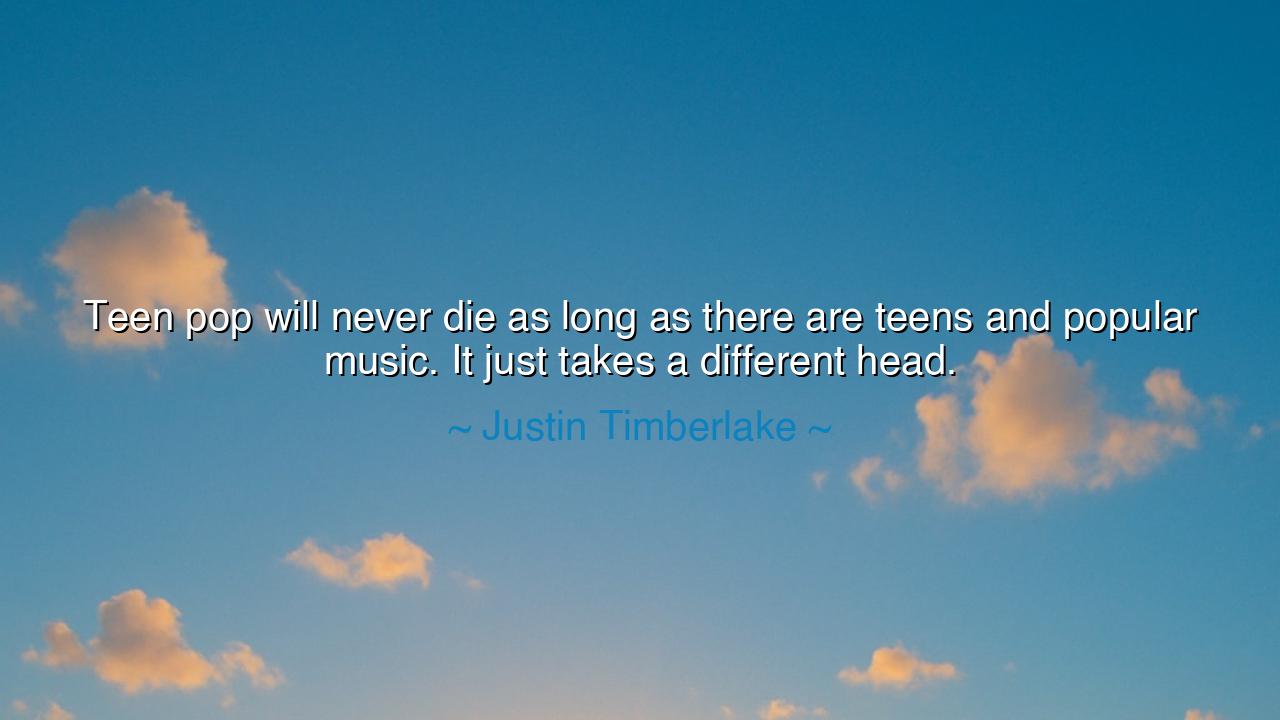
Teen pop will never die as long as there are teens and popular
Teen pop will never die as long as there are teens and popular music. It just takes a different head.






Justin Timberlake once declared with clarity and conviction: "Teen pop will never die as long as there are teens and popular music. It just takes a different head." In this statement, he speaks to the enduring cycle of youth and sound, the way each new generation seeks its own voice, its own idols, and its own rhythms. For though styles shift, and stars rise and fall, the hunger of the young for songs that speak to their hearts is eternal. Timberlake, himself a child of teen pop’s golden wave, reminds us that this force is not a passing fad but a renewing river—ever changing in face, yet constant in flow.
The origin of his words lies in Timberlake’s own journey. As a member of *NSYNC, he rode the crest of late 1990s and early 2000s teen pop, alongside figures like Britney Spears and Christina Aguilera. He witnessed firsthand the frenzy of millions of young fans, the way music became not just entertainment but identity, culture, and belonging. Later, as he matured and reinvented himself musically, he recognized that while artists age, the energy of teen pop simply finds new vessels, new “heads,” who embody the spirit of the age.
History confirms this truth. In the 1960s, the Beatles ignited hysteria among teenagers with their catchy melodies and boyish charm, embodying the teen pop of their era. In the 1970s, the Bay City Rollers carried the banner. In the 1980s, acts like New Kids on the Block took the torch. Timberlake himself, in the 1990s, stood at the forefront of this cycle, only to see it reborn in later years through groups like One Direction and solo artists like Taylor Swift. Each time, the faces change, but the essence—songs that speak to youth, love, longing, and belonging—remains eternal.
What Timberlake reveals is that teen pop is not about the artist alone—it is about the audience. As long as there are young hearts yearning for expression, for love songs to carry their daydreams, for rhythms to dance away their frustrations, teen pop will find its champions. The music shifts with the times—adopting new sounds, technologies, and styles—but the need itself never fades. The “different head” he speaks of is the new star, the new symbol of a generation, who arises to embody what millions of young souls feel but cannot yet articulate.
There is also wisdom in recognizing the transience of fame and the permanence of tradition. No single artist can hold the mantle of teen pop forever. The role passes, as all crowns do, to the next who will carry it forward. Yet the tradition itself—this marriage of youth and popular song—remains unbroken across the decades. The wise artist, like Timberlake, understands that their place in this cycle is temporary, but that their contribution joins a great chain of voices stretching across generations.
For us, the lesson is clear: do not dismiss the passions of youth as trivial or fleeting. What seems like mere infatuation or hysteria is in truth the pulse of a generation, the songs that will echo in their memories long after they have grown. Respect the music of the young, even if it is not your own, for it carries the weight of their becoming. And if you are young, do not be ashamed of what you love—sing it loudly, for it is your time, your voice, your rhythm.
Therefore, children of tomorrow, remember Justin Timberlake’s words. Know that the songs of youth are not meant to last forever, but to light a fire in their season. Cherish them, for they are the soundtrack of your awakening. And know also that when one age passes, another will rise, bearing new voices, new idols, new “heads.” For as long as the world births new dreamers, teen pop will never die—it will only be reborn.






AAdministratorAdministrator
Welcome, honored guests. Please leave a comment, we will respond soon